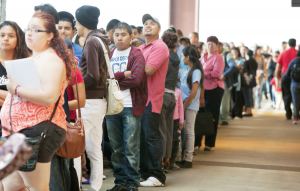SALT LAKE CITY (AP) — Nearly 4,800 young people in Utah have been given temporary reprieves from deportations under President Barack Obama’s deferred action initiative that was launched one year ago.
New figures from the Department of Homeland Security show nearly 6,400 people in Utah applied, with three-fourths getting approved.

The Utah contingent is only a tiny portion of the 430,000 who have been approved across the country. Homeland Security Secretary Janet Napolitano said in a blog post this week that a total of 500,000 requests were submitted.
Obama’s program offers young people brought to the country as children and living in the U.S. illegally the chance to stay and work if they met certain criteria.
To qualify, they must show that they came to America before their 16th birthday, and were 30 years old or younger when the policy was announced on June 15, 2012. They must also have lived in the U.S. continuously since 2007, and either be in school, have graduated from high school or served in the military. And they can’t have a serious criminal record or pose a threat to public safety or national security.
The program does not lead to residency or citizenship, but it spares these immigrants from living under the constant cloud of deportation. When Obama announced it last year, critics accused him of pandering to Latino voters a few months before the presidential election. Other critics have called it amnesty.
One of the people approved in Utah is Nadia Torres, who came to the United States from Mexico as a baby with her parents. Without proper documents, Torres envisioned a future working in low-paying jobs.
But, her future looks much different now that she’s been approved in the program. Torres, who is in her mid-20s and has 3-year-old son, has a Social Security number and is finishing her high school degree. She hopes to go to nursing school.
“It changed my life,” Torres told the Tribune. “I thought I would always have minimum-wage jobs at best. Now I want to be a nurse. Now that is possible.”
The initiative is helping many young people go to college and get better jobs, said Tony Yapias, director of Proyecto Latino in Utah.
It is a “blessing to a lot of dreamers who came here as children, through no fault of their own,” said Tony Yapias, director of Proyecto Latino. “They often faced deportation. Now, many of them are going back to school and are working in jobs that they actually want instead of minimal jobs.”
Yapias only wishes more people without documents in Utah would have applied. He said it’s a misconception that waiting for an immigration overhaul is a better route.
But Diana Paredes, program coordinator for Communities United, says the reprieves are only temporary and don’t eliminate the need for wholesale immigration reform.
“They can’t vote. They can’t participate in a lot of government programs, like AmeriCorps,” Paredes told The Tribune. “People who qualify for government scholarships often can’t apply for those. … Many of them are still living in a household where their parents are undocumented and are crippled by their parents’ impediments.”




